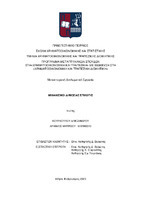Μηχανισμοί δημόσιας επιλογής

View/
Keywords
Μηχανισμοί δημόσιας επιλογής ; Επιμερισμός κόστους ; Δημόσια επιλογή ; Shapley value ; Πυρήνας ; Nucleolus ; Διαχωρίσιμα κόστη ; Υπολειπόμενα οφέληAbstract
This thesis begins with the analysis of Mechanism Theory and Public Choice Theory. It refers to the Design of Dominant Strategy Mechanism, and the execution of its design approach. Similarly, the lessons of the Public Selection are analyzed through references to its fundamental principles, its institutions and Mechanisms, the universal meaning of elections, as well as the bureaucratic issues we encounter. In addition, references are made to decision making, problem solving and their classification.
In the second chapter, the Cooperative Games are analyzed through references to autonomous principles and "principles without subsidies". Here is an overview of cost allocation with an emphasis on the Nucleolus method. There is also an analysis of decision-making in the Public Sector, the Cost-Sharing Coalition Game, the comparison between "good" and "bad" decisions, as well as the Surplus-Sharing Model.
The third chapter presents the definitions of the mechanisms found in the thesis, as well as the example of the "Capital Tax".
In the fourth chapter, the application of the Cost Allocation concepts of the Game Theory approach to the example of water resources is analyzed. Then follows a comparison of methods used showing their usefulness.
Finally, the fifth chapter of this thesis presents the conclusions and then the relevant bibliography.


